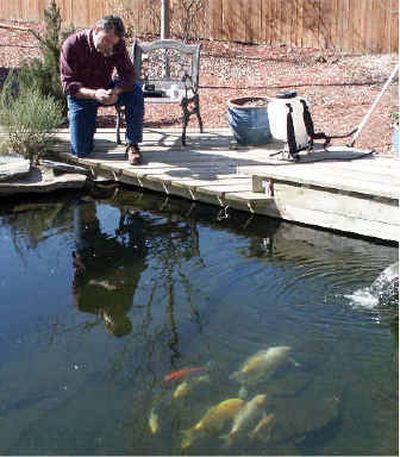‘Slime Slayer’ plans to have positive impact on environment’s future

“Slime Slayer,” a name tagged on Mark Morgan by a customer, is fitting for his line of work. Morgan, 47, specializes in ridding ponds of algae, sewer lagoons of solids and grease traps of grease.
The son of a retired Idaho State Police trooper, he graduated from Post Falls High School and earned a bachelor’s degree in business from Boise State University then began employment with Toledo Scales.
His work with scales introduced him to the food processing business, where he observed the dumping of large amounts of waste into the environment. This led him to research ways for removing waste naturally and his eventual involvement with a Montana company producing natural, environmentally safe digesting bacteria.
Morgan carries a portfolio of “before” and “after” photos and customer’s testimonials with him to prove his success. After he treated Hayden Lake Country Club’s ponds for a summer, course superintendent Scott Shillington wrote, “our ponds displayed excellent water clarity the entire season and algae was practically nonexistent.”
It’s positive feedback like that keeps Morgan satisfied with his career choice.
What is your job title? “Sole proprietor of Northwest Environmental Services.”
How long have you been doing this? “Five years working evenings and weekends to determine markets and effective solutions prior to release in January 2004.”
How did you choose this line of work? “Working in the weighing and measurement industry, I was exposed to enormous amounts of food, animal and human waste. As I saw the problem growing faster than the solution, I researched ways to naturally eliminate waste without the use of chemicals and their by-products.”
Are you paid: (a) well; (b) more than you are worth; (c) slave wages, (d) could be better? “Prices are set by the manufacturer of the company and the product we represent exclusively. The amount you earn is totally set upon your productivity. Often times we suggest alternative solutions in which our compensation is the customer’s satisfactory results.”
What is the best thing about your job? “To know that you can, with pride, look at tremendous amounts of waste being eliminated without adverse side effects. To know that the condition in which we leave this earth is representative of how we lived.”
What is the worst thing about your job? “Long hours and working within that window of time, so that total effective results are achieved. Most applications to toxic waste contamination must be done between 2 and 5 a.m.”
Do you plan on doing this job (a) until retirement; (b) until something better comes along? “This line of work will be my retirement. My plans are to have a very positive impact on environmental waste as economists project it to be the largest issue we face by the year 2007.”
Do you have any on-the-job funny stories? “While doing an application to a pond in eastern Idaho at a golf course, I was called by the owner after applying our bacterial products. He said the water was crystal clear, but his fish looked like lizards. The bacteria had eaten all the dead scales off the fish and in two weeks were replaced by new growth. Neither of us knew what to expect.”
Any bad experiences? “The only bad experiences are when I am told by any facility, be it private or public, that I am nothing but a tree-hugger and a can-saver and that they could care less about the cleanup of hazardous, toxic environmental waste.”
If there was a movie made about you and your job, what actor should play you? “Grizzly Adams, as he truly cared for the habitat and the conditions of the environment, for future generations to experience.”